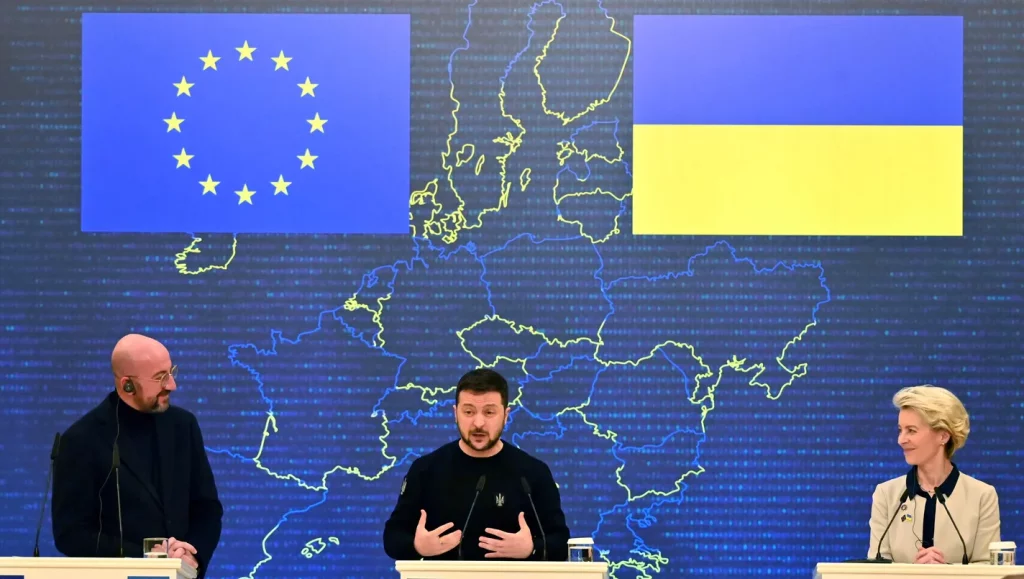As the focus of the world turns to the Israel-Hamas conflict, Ukraine finds itself in a difficult situation and is dubbed the “sore loser.” Many Ukrainians are upset, believing that the West and the United States have turned their backs on Ukraine and left Kyiv in desperate need of financial and military support. This article explores the intricacies and difficulties that Ukraine encounters on the international scene.
The Financial Tightrope:
It is becoming harder for Kyiv to get the necessary financial backing. The nation primarily depends on aid from the West, which must pay for a sizeable share of its $43 billion budget for 2024. Sergey Marchenko, the finance minister for Ukraine, expressed worries and emphasised that Western allies seemed weary and uninterested. Despite the ongoing crisis with Russia, Ukraine is concerned that its allies seem to be preoccupied.
The Looming Distractions:
The impending elections in Europe and the United States are an important diversion. Governments are having to change their priorities as a result of the shifting global environment and internal political dynamics in different nations. In this situation, the conflict in Ukraine runs the risk of being overshadowed by the Middle East crisis, which is gaining more and more international attention.
The Impact on Congressional Support:
The lack of interest shown by the US Congress in Ukraine’s situation is among the most important factors. Republicans and Democrats, who both have a major say in how financial help is distributed, appear to be shifting away from supporting Ukraine. Many people, particularly in middle America, are wondering why the United States should finance yet another foreign fight.
Only 41% of Americans backed arming Ukraine, down from 46% in May, according to a Reuters/Ipsos poll. In May, Republicans’ support for arming Ukraine dropped from 39% to 35%. Support among Democrats dropped from 61% to 52%.
According to Elizabeth Hoffman, Director of Congressional and Government Affairs at the Centre for Strategic and International Studies, this waning support is hurting the prospects for new aid packages.
The Nexus with NATO:
As the greatest contributor to NATO, the United States would probably have an impact on the alliance if it reduced its support for Ukraine. Given that Russian aggression is still a threat, this prospective change in objectives might put Ukraine in a difficult situation.
The Israel-Hamas Factor:
In addition, the Israel-Hamas confrontation has diverted focus from the Ukraine conflict on a worldwide scale. The U.S. shifted money and attention away from Ukraine while reiterating its support for Israel and promising greater military aid. As the U.S. becomes increasingly involved in the Middle East situation, which is recognised for its complexity and protracted peace procedures, this shift in focus may be advantageous to Russia in its confrontation with Ukraine.
Diverging Support Dynamics:
Following the Hamas attack on Israel, the United States quickly sent its largest aircraft carrier, the USS Gerald R. Ford, to the eastern Mediterranean in order to send a strong message to Iran and its proxies in Hezbollah. In contrast, more than 20 months after Russia’s invasion, Ukraine still does not have the F-16 fighter fighters that the United States had promised.
This contrast in support is obvious: the U.S. has been giving Israel, a nation with a strong military, substantial and unequivocal backing, while aid to Ukraine has been slower and less enthusiastic.
The Implications for Ukraine:
According to Volodymyr Zelenskyy, president of Ukraine, the Israeli-Gaza war has temporarily diverted attention from his country. Both of the country’s major political parties are seeing a decline in public support for arming Ukraine, which is worrying for Kyiv given how heavily it depends on American armaments to ward off a Russian invasion.
Only 41% of respondents, down from 46% in May, said they thought Washington should arm Ukraine, according to a recent Reuters/Ipsos survey. The fact that certain Republicans, notably those who support the late President Donald Trump, oppose sending help to Ukraine adds to the complexity of the situation. The issue is still up in the air despite a promise to vote separately on a package for Ukraine.
In conclusion, concerns about dwindling support from Western allies, particularly the United States, have arisen as a result of the ongoing Israel-Hamas conflict’s diversion of attention away from Ukraine. Ukraine is at a turning point as it navigates a complicated web of international agendas, elections, and evolving geopolitical factors. The difficulties are growing, and in this shifting international environment, it is doubtful whether Ukraine will be able to obtain the financial and military support needed to address its protracted confrontation with Russia.
